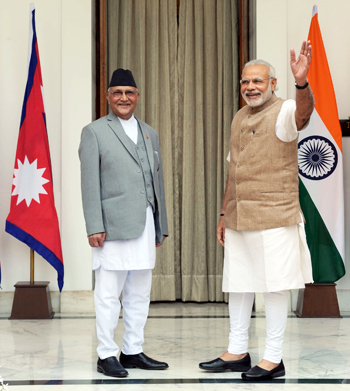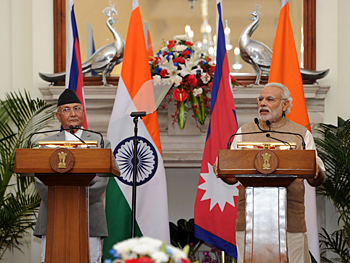INDIAN ARMED FORCES CHIEFS ON
OUR RELENTLESS AND FOCUSED PUBLISHING EFFORTS

SP Guide Publications puts forth a well compiled articulation of issues, pursuits and accomplishments of the Indian Army, over the years

I am confident that SP Guide Publications would continue to inform, inspire and influence.

My compliments to SP Guide Publications for informative and credible reportage on contemporary aerospace issues over the past six decades.
- Interim Defence Budget 2024-25 — An Analysis
- Union Defence budget 2024
- Indian Army: In quest of greater firepower and policy recommendations for gaps
- Indian Army Annual Press Conference 2024
- 6G will transform military-industrial applications
- Tata Boeing Aerospace Delivers 250 AH-64 Apache Fuselages, Manufactured in India
Visit of PM Oli — restoring goodwill
 |
By Lt. General P.C. Katoch Former Director General of Information Systems, Indian Army
 Prime Minister of Nepal, Shri K.P. Sharma Oli calling on the President, Shri Pranab Mukherjee, at Rashtrapati Bhavan, in New Delhi on February 20, 2016  The Prime Minister, Shri Narendra Modi with the Prime Minister of Nepal, Shri K.P. Sharma Oli, at Hyderabad House, in New Delhi on February 20, 2016  The Prime Minister, Shri Narendra Modi delivering his statement to the media at the joint media briefing with the Prime Minister of Nepal, Shri K.P. Sharma Oli, at Hyderabad House, in New Delhi on February 20, 2016 Nepal's Prime Minister KP Sharma Oli's six-day visit to India, first foreign visit after becoming PM has ushered in the much needed uptick in bilateral relations after the Madhesi agitation in Nepal blockading the India-Nepal trade routes. The new Constitution failed to address Madhesi aspirations in terms of federalism, electoral representation and citizenship, leading to the community enforcing a five-month-long blockade along the India-Nepal border. Wracked by the blockade and economic crunch Oli at one stage had even blamed India stating that his dream to develop the Himalayan nation as "vibrant" had been shattered by the "embargo imposed by India". The border blockade led to a severe shortage of essential supplies, including fuel and medicines, in Nepal. Last month Nepal's Parliament passed the first round of constitution amendments tol enhance Madhesi representation in government bodies on the basis of proportional inclusion and make population the main criteria for drawing up electoral constituencies. This led to lifting of the border blockade on February 5 that eased the shortage of essential goods and commodities in the country. However, the likelihood of another round of protests erupting remains, as many demands of the Madhesi are yet to be met. It is obvious that India helped Nepal through back channel diplomacy to go for the first round of constitutional amendment. During the visit, PM Oli stayed at the Rashtrapati Bhavan, called on the President and Vice President and held extensive discussions with Prime Minister Narendra Modi. Oli was forthright in saying that his main mission behind this visit was to "clear the misunderstanding" and take ties between the two countries to the same level as in 2014, when Prime Minister Narendra Modi had visited Nepal. He emphasized further saying, "The misunderstanding that persisted in the last few months is no longer there. I believe our relationship will greatly benefit from our discussions. It is high time to look at India-Nepal relations with a forward-looking approach in the interest of the two countries and their people." On his part PM Modi described the new Constitution of Nepal as a great achievement, acknowledged the two amendments adopted by the Nepali Parliament, and expressed hope that Khatmandu will consult all political parties to come together and resolve rest of the issues. Oli also thanked Modi and people of India for "spontaneous support" in the aftermath of the earthquake. Seven MoUs have been signed between India and Nepal during PM Oli's visit spanning areas like Nepal's post-earthquake reconstruction and enhancing connectivity and transit facilities, latter furthering the Bangladesh, Bhutan, Indian, Nepal (BBIN) project of sub-regional connectivity. These agreements include improving of road infrastructure in Nepal's Terai area, transit between Nepal and Bagladesh through Kakarbitta-Banglabandh corridor, operationalisation of Vishakapatnam port and rail transport from Vishakapatnam, in order to give sea access to Nepal. PMs Modi and Oli jointly inaugurated the Muzaffarpur-Dhalkebar transmission line, whose initial supply of 80 MW, will be augmented to 200 MW by October 2016 and 600 MW by December 2017. India had already committed USD 1 billion line of credit to Nepal during PM Modi's visit and another USD 1 billion that India had pledged during External Affairs Minister Sushma Swaraj's trip to Kathmandu for the country's post-earthquake reconstruction. .At the third meeting of the India-Nepal Joint Commission held at Kathmandu in July 2014, it had been decided to establish an Eminent Persons Group (EPG). The EPG comprises eight members with each country nominating four members, preferably a parliamentarian, a lawyer, an economist and a civil society activist. The EPG has now been constituted. Its mandate would be to comprehensively review bilateral relations and recommend measures including institutional frameworks to further enhance bilateral ties. Both sides also discussed ways to patrol open borders and intensify cooperation between security agencies so that criminals and terrorists are not allowed to take advantage of the open borders. Modi said it was clear that "Nepal's stability is linked to India's security" and that the two sides agreed to fight growing extremism and terrorism. Oli was accompanied by a 77-member delegation including his wife, Deputy Prime Minister and Foreign Minister, Finance Minister, Energy Minister and Home Minister among others. His visit certainly helps alleviate friendship bonds that appeared getting clouded in wake of the Madheshi agitation over past few months. The visit helps clear the misunderstanding that India was the cause of the blockade and interfering in the internal affairs of Nepal. As per Foreign Secretary S Jaishankar, PM Oli has given assurances on issues pertaining to constituency delimitation and citizenship would be addressed in a time-bound manner, and that India was confident these would be followed through. According to Jaishankar, Oli's visit was "forward-looking". Progressing Indo-Nepal ties in conjunction Bhutan and Bangladesh will certainly help development in all these countries, the region and our northeast. The ground reality is that India and Nepal have ancient historic ties that based on common culture, beliefs and geography that can hardly be denied or destroyed. PM Oli's visit has come at the right time to provide the impetus to raise bilateral relations to previous levels and beyond. There is every reason for Indo-Nepal friendship to keep going to higher levels.
|





